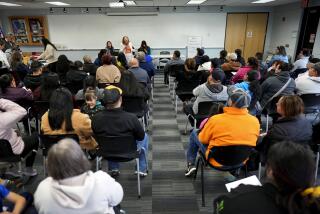Iowa Hamlets Curb Rivalry in Crisis : Economy: Some rural towns are teaming up to face economic adversity. Although they retain their separate identities for such traditions as football games, they are trying to share resources to attract businesses and to house workers.
- Share via
THORNTON, Iowa — When it comes to a football or basketball game, Rockwell is the enemy around here. But, when it comes to a more critical issue--survival--old rivals are new allies.
These two communities have decided that united they stand, divided they fall into the bleak landscape of ghost towns littering America’s heartland.
So Thornton, Rockwell and five other hamlets have formed a “cluster” called the Area Community Commonwealth, one of a growing number of such programs in Iowa that aim to keep small towns alive by sharing classrooms, workers or equipment and pooling resources to attract business.
“It’s going to take a joint effort to save our schools and save our Main Streets,” said Chris Nannenga, the commonwealth’s founder. “We realized we’ve got to do something to stop our erosion. Basically, our only solution is to work together.”
About 17 Iowa “clusters” have been or are being formed--one along Interstate 80, others within counties--to offset the 1980s’ rural economic decline that has seen farmers lose their land, merchants lose their stores and hard-working people lose their dreams.
“If you’re sitting in a town of 500, and you start talking about economic and community development, your options are so limited,” said Tim Borich, an Iowa State University rural development specialist working with some of the clusters.
“What we’re really doing is redefining what community is . . . and dispelling some of the fatalism. Maybe, if we work together, we can keep the boat afloat yet.”
The Area Community Commonwealth, the first cluster, was formed in 1986. Besides Thornton and Rockwell, the group’s towns are Sheffield, Dougherty, Swaledale, Chapin and Meservey.
For years, the communities were divided by athletic and economic rivalries, vying for trophies and business dollars. “There was not a sense of common good,” Nannenga said. “It was all for you, none for me.”
Most of the towns had struggled with shrinking school enrollments, the domino-like closings of hardware stores, factories and taverns and the shopping exodus to Mason City, which is large enough to support K mart and Wal-Mart stores.
“Young people left,” said Gene Persons, a grocer and the commonwealth treasurer. “Unemployment was high. People’s attitudes were down.”
It happened all across Iowa. Almost half of the gasoline stations and nearly a third of the state’s groceries closed between 1976 and 1988, said Ken Stone, an Iowa State economist.
One big obstacle is that most small towns do not have enough money to hire experts to lure industry or enough voters to wield much political influence.
The commonwealth towns’ separate populations, for example, range from 128 to about 1,200. But, as a group, 6,500 people “give us a little more leverage to be listened to in the Legislature,” Persons said.
The group’s biggest coup was last year’s 60th birthday celebration for Mickey Mouse, organized with the Walt Disney Co. A much-publicized giant silhouette of Mickey’s head, visible from the air, was created by meticulous surveying and planting in a 530-acre corn and oat field between Sheffield and Dougherty. Transcontinental airline pilots pointed it out to their surprised passengers.
Disney worked with the towns to hold a two-day party in August in Sheffield, which drew 45,000 people. The commonwealth netted about $48,000 in profits from T-shirts and hats and other concessions.
Other projects are much smaller, such as a grade-sharing program in which two school districts exchange junior high and high school students, filling classrooms and saving money.
Two towns share a police officer, and some small retail outlets have set up satellite stores so residents do not have to travel 20 miles to get film developed or buy vegetables or hardware.
There’s no more Us vs. Them.
“We’ve turned a win-lose situation into a win-win situation,” Nannenga said.
An industrial park was established in Rockwell in 1988 and a small water-bottling company has opened, receiving a $30,000 loan from a $50,000 state grant that the commonwealth received. A company that makes equipment that picks up recyclable products is considering moving there.
“We can’t handle the industries that are going to employ 150 to 200 people,” Nannenga admitted. “We don’t have the housing. We don’t have the infrastructure. We may not be able to sell washing machines, but we can fix them.”
Practicality is an important part of a cluster’s success, said Kathy Beery, Iowa’s rural development coordinator. “If you have some unrealistic goals, it’s going to be very frustrating. You don’t want to come together just because you’re desperate. Perhaps there’s some natural resource they can build on . . . or perhaps some existing business.”
Five communities in a cluster north of Des Moines are doing that, developing a nature trail-biking corridor.
More to Read
Sign up for Essential California
The most important California stories and recommendations in your inbox every morning.
You may occasionally receive promotional content from the Los Angeles Times.










